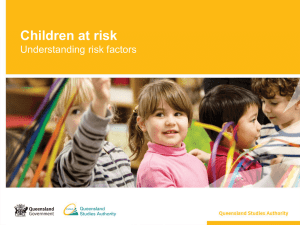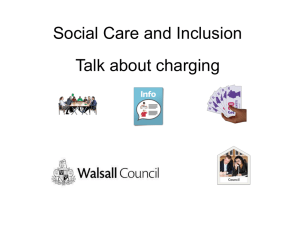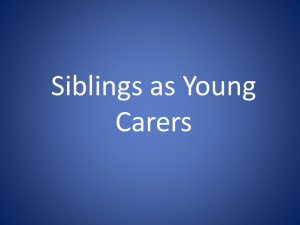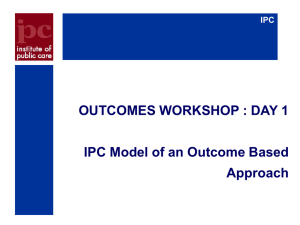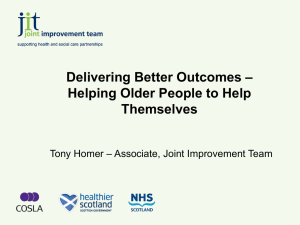Moira-Fraser - Carers Trusts Journey So Far
advertisement
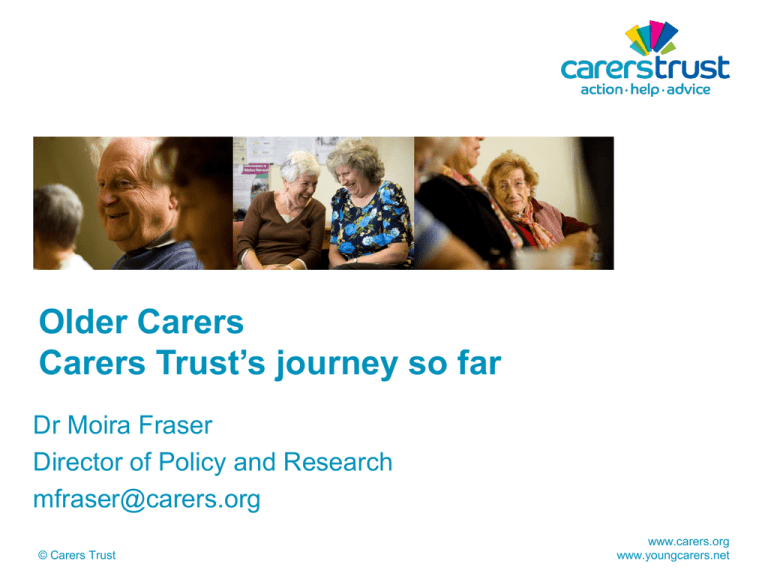
Older Carers Carers Trust’s journey so far Dr Moira Fraser Director of Policy and Research mfraser@carers.org © Carers Trust www.carers.org www.youngcarers.net Carers Trust • Is the largest UK charity specifically supporting carers • We reach more than 450,000 carers, including more than 30,300 young carers, through a unique network of 200 independently managed carers centres and schemes, 107 young carers services and interactive websites. • Support provided by Carers Trust network partners includes advice, information and advocacy, training, emotional support, peer support, and desperately needed breaks. © Carers Trust www.carers.org www.youngcarers.net Older Carers • Age of carers supported, 2011/12, Carers Trust Carers Centres • UK Base: extrapolated from age breakdown provided by 128 centres for 261,444 adult carers, and total of 21,216 young carers. © Carers Trust www.carers.org www.youngcarers.net Older Carers • Rising demographic – clear need to address issue • Lack of research to inform our policy and service development • Need more clarity on specific issues • Need basis to start from – can’t fundraise without track record © Carers Trust www.carers.org www.youngcarers.net How we approached the project • Low (i.e. no) budget and in-house • Need to generate stats and media coverage with possibility of further work later • Survey monkey and hard copy via local services • Tied in with fundraising appeal, therefore support from colleagues on data input • Analysis via Survey Monkey, Excel, SPSS • £100 M&S voucher donated as incentive © Carers Trust www.carers.org www.youngcarers.net Respondents • 639 carers 70.5% women, 29.5% men 250 209 200 138 150 127 100 76 35 50 30 21 3 0 0 90-94 95-99 100+ 0 60-64 65-69 70-74 75-79 80-84 85-89 did not specify • Proportion of men increased with age • Significant negative correlation between age and number of people cared for r= -.157, p>0.001. • 65% have own long term health problem or disability. © Carers Trust www.carers.org www.youngcarers.net Paid employment • Around a quarter of the carers in the 60–64 age group are still in work. • Still significant number in paid work 65–69 and 70–74 – 8.1% and 4.9% respectively. Those still in work often commented that this added to the aspects of their life they had to juggle and often their levels of tiredness. • “An average day for me is 6am–12pm nearly every day. This is due to the combination of my caring role looking after my daughter and two grandsons as well as having a part-time job.” • “Very tiring physically and mentally, especially as I have to work full time to pay for the things I need to carry out my caring role.” © Carers Trust www.carers.org www.youngcarers.net Finances • Carers in the youngest age group surveyed (60–64) reported having the most difficulty financially. • Few of this group said they felt able to save money a lot of the time or always (20%) • only 30% said they are satisfied a lot of the time or always with their financial position. © Carers Trust www.carers.org www.youngcarers.net Impact of caring on physical health • 68.8% of older carers reported that caring had had a negative impact on their physical health. • 49.8%. said their physical health had deteriorated in the last year • lack of opportunities they now have for exercise and other activities – not able to leave the person they care for or too exhausted, – “Unable to leave house unless ‘sitter’ relieves me – hence lack of fresh air/exercise.” – “I have had to lift my wife and her wheelchair on occasions … and this has given me a crumbling spine which I have to be careful about but it’s not too bad.” • A third of respondents stated that they had delayed or cancelled treatment for a health condition due to the demands of caring © Carers Trust www.carers.org www.youngcarers.net Impact of caring on mental health • A 68.8% reported negative impact of caring on mental health • Higher in the 60–69 age group - 76.7% of carers of this age reporting a negative impact. • 42.8% of carers said their mental or emotional health had deteriorated over the last year – “If I really stopped to think about what I was doing, and for how long I might be doing it, I could despair. • Caring for more than one person particularly stressful. Combining this with paid work, may explain the stress of those in the 60–69 age group. – “I get depressed and very low at times being in the house sandwiched between generations.” © Carers Trust www.carers.org www.youngcarers.net Launch • Media launch Sept 2011 • Used as basis for direct marketing fundraising campaign © Carers Trust www.carers.org www.youngcarers.net Thinking about what’s next - Our strategy • Profile – how can we raise awareness? • Solutions – what will work best for carers? • Influence – Who needs to be persuaded and how? © Carers Trust www.carers.org www.youngcarers.net • Research provided evidence of particular needs of dementia carers. Proposal for research to explore their experiences and service requirements funded by Ecclesiastical. Carers Trust currently working in partnership with The University of York/Firefly • High level policy round table event held in 2013 with HRH the Princess Royal. • Dementia Action Alliance national call to action on carers– outcomes fed in • Peoples Health Trust - report used as evidence to base bid for health lottery funding to develop local support for older carers - £1.3M 2011-2014, funding 22 projects across England, Wales and Scotland. • Currently developing significant bid for 3 year finding for older carers policy and service development work. © Carers Trust www.carers.org www.youngcarers.net Thoughts and Suggestions? • What now? Think in terms of: – Profile – Solutions – Influence. © Carers Trust www.carers.org www.youngcarers.net Our research report: The Princess Royal Trust for Carers (2011) Always Concerned , Always on Call, Essex: PRTC. Can be found at: http://www.carers.org/sites/default/files/always_on_call_always_concerned.pdf © Carers Trust www.carers.org www.youngcarers.net
